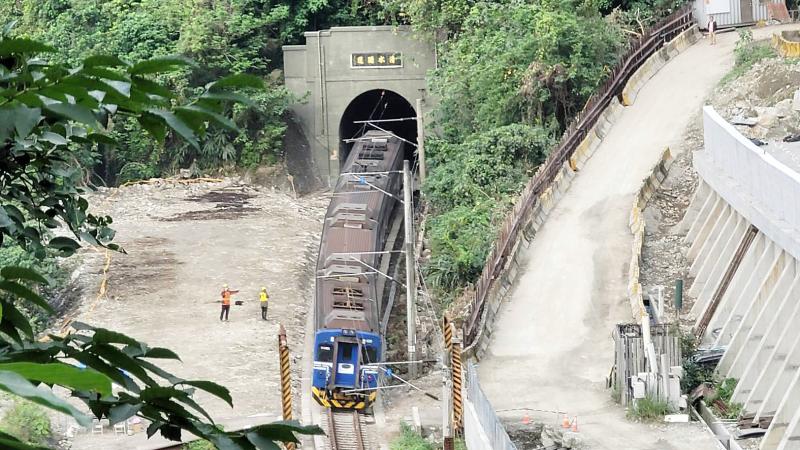A section of railway in eastern Taiwan that was damaged in a deadly train crash on April 2 reopened yesterday, with the first train on the route departing at 5:27am.
Train services were able to resume after the Taiwan Railways Administration (TRA) on Friday completed its repairs and safety inspections on the track in the area of the Cingshuei Tunnel (清水隧道) in Hualien County, where the accident occurred, killing 49 people and injuring at least 200.
A local train carrying Minister of Transportation and Communications Lin Chia-lung (林佳龍), TRA Acting Director-General Chi Wen-chung (祁文中) and other passengers made the first scheduled run on the repaired track, departing from Yilan County at 5:27am and passing through the Cingshuei Tunnel.

Photo: CNA
“The ride was smooth,” Lin said, upon arrival at Hualien Railway Station at 7:08am.
Now that the section of railway between Chongde and Heren stations has reopened, Lin said he hoped that the TRA would work on rebuilding its safety record by carrying out essential reforms.
The reopening of the railway section marks the completion of a major phase of the work that needed to be done after the accident, Lin said, adding that it was his last day on the job, as he had tendered his resignation to take responsibility for the crash.
The fatal accident occurred at 9:28am on April 2, when Taroko Express No. 408 crashed inside the Cingshuei Tunnel after colliding with a crane truck on the track near the tunnel’s entrance.
The collision caused part of the eight-carriage train, which was traveling at more than 100kph, to derail and pile up inside the tunnel, footage showed.
Lin offered to resign one day after the derailment and later tendered his written resignation to Premier Su Tseng-chang (蘇貞昌), who approved it on Thursday last week.
Lin returned to Taipei later yesterday on a Puyuma Express train to attend a farewell party hosted by staff at the Ministry of Transportation and Communications.

The US government has signed defense cooperation agreements with Japan and the Philippines to boost the deterrence capabilities of countries in the first island chain, a report by the National Security Bureau (NSB) showed. The main countries on the first island chain include the two nations and Taiwan. The bureau is to present the report at a meeting of the legislature’s Foreign Affairs and National Defense Committee tomorrow. The US military has deployed Typhon missile systems to Japan’s Yamaguchi Prefecture and Zambales province in the Philippines during their joint military exercises. It has also installed NMESIS anti-ship systems in Japan’s Okinawa

TRAGEDY STRIKES TAIPEI: The suspect died after falling off a building after he threw smoke grenades into Taipei Main Station and went on a killing spree in Zhongshan A 27-year-old suspect allegedly threw smoke grenades in Taipei Main Station and then proceeded to Zhongshan MRT Station in a random killing spree that resulted in the death of the suspect and two other civilians, and seven injured, including one in critical condition, as of press time last night. The suspect, identified as a man surnamed Chang Wen (張文), allegedly began the attack at Taipei Main Station, the Taipei Fire Department said, adding that it received a report at 5:24pm that smoke grenades had been thrown in the station. One man in his 50s was rushed to hospital after a cardiac arrest

PUBLIC SAFETY: The premier said that security would be tightened in transport hubs, while President Lai commended the public for their bravery The government is to deploy more police, including rapid response units, in crowded public areas to ensure a swift response to any threats, President William Lai (賴清德) said yesterday after a knife attack killed three people and injured 11 in Taipei the previous day. Lai made the remarks following a briefing by the National Police Agency on the progress of the investigation, saying that the attack underscored the importance of cooperation in public security between the central and local governments. The attack unfolded in the early evening on Friday around Taipei Main Station’s M7 exit and later near the Taipei MRT’s Zhongshan

ON ALERT: Taiwan’s partners would issue warnings if China attempted to use Interpol to target Taiwanese, and the global body has mechanisms to prevent it, an official said China has stationed two to four people specializing in Taiwan affairs at its embassies in several democratic countries to monitor and harass Taiwanese, actions that the host nations would not tolerate, National Security Bureau (NSB) Director-General Tsai Ming-yen (蔡明彥) said yesterday. Tsai made the comments at a meeting of the legislature’s Foreign Affairs and National Defense Committee, which asked him and Minister of National Defense Wellington Koo (顧立雄) to report on potential conflicts in the Taiwan Strait and military preparedness. Democratic Progressive Party (DPP) Legislator Michelle Lin (林楚茵) expressed concern that Beijing has posted personnel from China’s Taiwan Affairs Office to its